This is a list of notable events in music that took place in the year 1939.

This is a list of notable events in music that took place in the year 1933.
This is a list of notable events in music that took place in the year 1930.
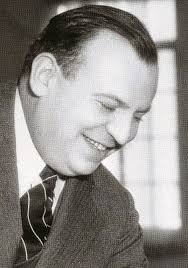
Alexander Dubin was an American lyricist. He is best known for his collaborations with the composer Harry Warren.

James Francis McHugh was an American composer. One of the most prolific songwriters from the 1920s to the 1950s, he is credited with over 500 songs. His songs were recorded by many artists, including Chet Baker, June Christy, Bing Crosby, Marlene Dietrich, Deanna Durbin, Ella Fitzgerald, Judy Garland, Adelaide Hall, Billie Holiday, Beverly Kenney, Bill Kenny, The Everly Brothers, Peggy Lee, Carmen Miranda, Nina Simone, Frank Sinatra, and Dinah Washington.

Shoot the Piano Player is a 1960 French New Wave crime drama film directed by François Truffaut that stars Charles Aznavour as the titular pianist with Marie Dubois, Nicole Berger, and Michèle Mercier as the three women in his life. It is based on the novel Down There by David Goodis.

Night After Night is a 1932 American pre-Code drama film starring George Raft, Constance Cummings, and Mae West in her first movie role. Others in the cast include Wynne Gibson, Alison Skipworth, Roscoe Karns, Louis Calhern, and Bradley Page. Directed by Archie Mayo, it was adapted for the screen by Vincent Lawrence and Kathryn Scola, based on the Cosmopolitan magazine story Single Night by Louis Bromfield, with West allowed to contribute to her lines of dialogue.
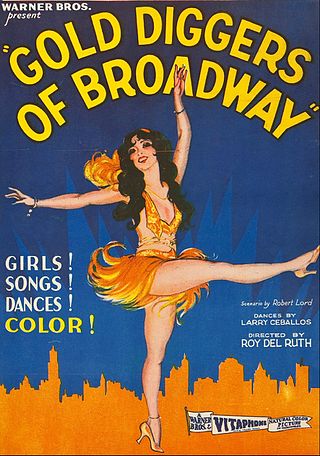
Gold Diggers of Broadway is a 1929 American pre-Code musical comedy film directed by Roy Del Ruth and starring Winnie Lightner and Nick Lucas. Distributed by Warner Bros., the film is the second all-talking, all-Technicolor feature-length film.
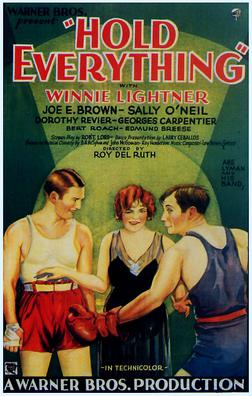
Hold Everything is a 1930 American pre-Code film. This musical comedy film was photographed entirely in early two-color Technicolor. The first all Technicolor musical comedy film was "On With the Show" in 1929. "Hold Everything" was adapted from the DeSylva-Brown-Henderson Broadway musical of the same name that had served as a vehicle for Bert Lahr and starred Winnie Lightner and Joe E. Brown as the comedy duo. The romantic subplot was played by Georges Carpentier and Sally O'Neil. Only three songs from the stage show remained: "You're the Cream in My Coffee", "To Know You Is To Love You", and "Don't Hold Everything". New songs were written for the film by Al Dubin and Joe Burke, including one that became a hit in 1930: "When The Little Red Roses Get The Blues For You". The songs in the film were played by Abe Lyman and his orchestra.

The Show of Shows is a 1929 American pre-Code musical revue film directed by John G. Adolfi and distributed by Warner Bros. The all-talking Vitaphone production cost almost $800,000 and was shot almost entirely in Technicolor.
Joseph Aloysius Burke was an American composer and pianist. His successful songs, written with various lyricists, included "Down Honolulu Way" (1916), "Oh How I Miss You Tonight" (1924), "Tiptoe Through the Tulips" (1929), "Moon Over Miami" (1935), "Getting Some Fun Out of Life" (1937) and "Rambling Rose" (1948) and "Painting The Clouds With Sunshine" (1929)

Kid Galahad is a 1937 American sports drama film directed by Michael Curtiz and starring Edward G. Robinson, Bette Davis, Humphrey Bogart and, in the title role, rising newcomer Wayne Morris. A boxing film, it was scripted by Seton I. Miller and distributed by Warner Brothers. It was remade in 1941, this time in a circus setting, as The Wagons Roll at Night, also with Bogart, and in 1962 as an Elvis Presley musical. The original version was re-titled The Battling Bellhop for television distribution in order to avoid confusion with the Presley remake.

Rumba is a 1935 American musical drama film starring George Raft as a Cuban dancer and Carole Lombard as a Manhattan socialite. The movie was directed by Marion Gering and is considered an unsuccessful follow-up to Raft and Lombard's smash hit Bolero the previous year.

Winnie Lightner was an American stage and motion picture actress.

Side Show is a 1931 American pre-Code musical comedy drama film directed by Roy Del Ruth and starring Winnie Lightner, Charles Butterworth, Evalyn Knapp and Donald Cook. It was produced and released by Warner Bros. The film was based on a story by William K. Wells. Although it was planned and filmed as a full-scale musical, most of the songs were cut from the film before release due to the public tiring of musicals.
She Couldn't Say No is the name of several films. The 1930 and 1940 films were based on the play She Didn't Say No! by Benjamin Kaye.

The Hard Way is a 1943 Warner Bros. musical drama film starring Ida Lupino, Dennis Morgan, and Joan Leslie. Directed by Vincent Sherman, it is based on a story by Irwin Shaw which was reportedly based on Ginger Rogers' relationship with her first husband Jack Pepper and her mother Lela.
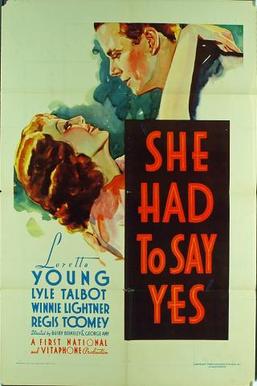
She Had To Say Yes is a 1933 American pre-Code film directed by George Amy and Busby Berkeley. It was Berkley's directorial debut. Loretta Young stars as a secretary who receives unwanted sexual advances when she is sent out on dates with her employer's clients. The film was promoted with the teaser "We apologize to the men for the many frank revelations made by this picture, but we just had to show it as it was filmed. The true story of the working girl."

Sinatra/Basie: The Complete Reprise Studio Recordings is a 2011 compilation album by American singer Frank Sinatra that consists of 20 songs he recorded with jazz pianist Count Basie. 10 tracks from "Sinatra–Basie: An Historic Musical First" (1962), and 10 more from "It Might as Well Be Swing" (1964).
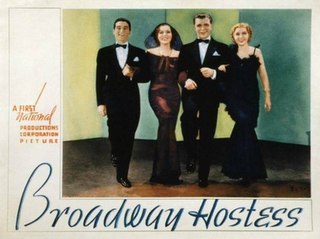
Broadway Hostess is a 1935 American romantic comedy musical film directed by Frank McDonald and starring Wini Shaw, Genevieve Tobin and Lyle Talbot. The film was nominated at the 1935 Academy Awards for the short lived Best Dance Direction category. For which Bobby Connolly was nominated for, along with the film Go into Your Dance.














